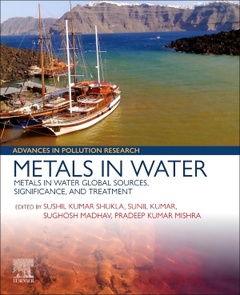Metals in Water Global Sources, Significance, and Treatment Woodhead Advances in Pollution Research Series
Coordonnateurs : Shukla Sushil Kumar, Kumar Sunil, Madhav Sughosh, Mishra Pradeep Kumar

Metals in Water: Global Sources, Significance, and Treatment covers metal pollution in water, where they come from, their effects, and remediation processes. Sections overview heavy metals pollution, including their global health impacts and remediation measures. Geogenic and anthropogenic input of heavy metals in water are described, along with global case studies, step-by-step methods on remediation techniques, different detection sensors, and assessment practices of toxicity of heavy metals. The book focuses on recent research surrounding heavy metals' contamination in water resources and its impact across the globe. Chapters incorporate both theoretical and practical aspects and serve as baseline information for water resources studies.
This book is useful for postgraduate students, teachers and researchers working in areas of water resources and pollution, hydrochemistry, environmental remediation and toxicology who are looking to understand the affects metals have on water, the environment and health, and also those looking for methods for remediation.
A. Sources and distribution of metals in water resources 1. Geogenic origin of metals and metalloid contamination in water resources 2. Air born contamination of metals in water resources 3. Metal contamination in water resources due to various anthropogenic activities like agriculture, industrial, transportation and mining 4. Local and regional hotspot of some metals like Hg, Cr, Pb, Cd and U 5. Global Distribution of metals in water resources like As, F and Fe
B. Detection of Metals 6. Various biological and other indicator for metal contamination in water 7. Various measurement techniques to detection of metals in water resources 8. Different advancer Sensors to detect different metals in water resources 9. Various indices to find out pollution and toxicity impact of metals 10.Various guideline by different environmental agencies related to the metals
C. Biogeochemistry of metals and assessment of toxicity 11. Metal pollution in aquatic environment and impact on flora and fauna 12. Metal contamination in groundwater source and impact assessment 13. Metal pollution in marine environment sources and impact assessment 14. Assessment of toxicity and wildlife and human health impacts of metals 15. Biogeochemical process, pH effect, oxidation reduction and complex process of metals in water resources 16. Effect of climate change on metal concentrations and distributions
D. Remediation and removal measure of Metals 17. Photocytalic degradation of metals from contaminated water 18. Phytoremediation of metals from contaminated water 19. Application of microbes to remove metals from contaminated water 20. Application of low-cost adsorbents for metals remediation 21. Metals removal by membrane filtration 22. Advance nanotechnology for metals remediation from contaminated water 23. Integrated method of metals remediation from contaminated water 24. Indigenous techniques to remove metals from contaminated water 25. Various method of the recovery of metals from the waste water
Dr. Sunil Kumar is a well-rounded researcher with more than 20 years of experience in leading, supervising and undertaking research in the broader field of Environmental Engineering and Science with focus on Solid and Hazardous Waste Management. He has contributed extensively to these fields and has h-index of 30 and i10-index of 43 (Google scholar); highly impressive for a non-academic researcher from India. His contributions since inception at CSIR-NEERI in 200 include 130 refereed journal publications, 04 books and 25 book chapters, 08 Edited volumes and numerous project reports to various governmental and private, local and International academic /research bodies. The list of his collaborations is long and includes key Indian universities, such as IIT Kharagpur, IIT Delhi and IIT Mumbai and prestigious regional institutes, such as Asian Institute of Technology (AIT) and Kasetsart University in Bangkok, Hong Baptist University as well as universities in US (Columbia, Texas A&M) and Europe (UN University and University of Uppsala).
Dr. Sughosh Madhav works as a Postdoctoral Fellow at the Department of Civil Engin
- Presents global case studies of sites contaminated by metals, effects on the environment, and successful remediation techniques
- Includes a whole section on remedial measures, with clear step-by-step "how to" guides
- Provides chapters covering detailed biogeochemical processes
Date de parution : 11-2022
Ouvrage de 450 p.
15.2x22.8 cm
Thème de Metals in Water :
Mots-clés :
?Absorption; Adsorption; Agriculture; Agro-ecosystem; Airborne metal; Alkaline precipitation; Anthropogenic activities; Anthropogenic sources; Applied microbiology; Aquatic animals; Aquatic ecosystem; Aquatic plants; Aquatic systems; Arsenic; Atmospheric deposition; Bioaccumulation; Biogeochemistry; Bioremediation; Chemical precipitation method; Contaminated water; Contamination; Developing nations; Diseases or human health; Drinking and wastewater sources; Ecotoxicology; Eichhornia crassipes; Electrochemical biosensors; Environmental contaminants; Environmental health; Food chain; Ganga Alluvial Plain; Gomati River; Heavy metal; Heavy metals; Heavy metals toxicity; Human health; Human health risk assessment; Indigenous; Industrialization; Industry; Low-cost adsorbents; Marine environment; Membrane filtration; Metal ions; Metal pollution; Metal remediation; Metal toxicity; Metals; Mining; Monsoon season; Nanomaterials; Nanoparticles; Nanotechnology; Nonpoint source; Organic pollutants; Phytoremediation; Point source; Pollution; Pollution indices; Purification; Rapid industrialization; Remediation; Removal; Separation; Sublethal effects; Technological advancement; Toxic; Toxicity; Toxicity assessment; Trace metals; Treatment; Urbanization; Wastewater; Wastewater treatment; Water contamination; Water pollution; Water-contamination


